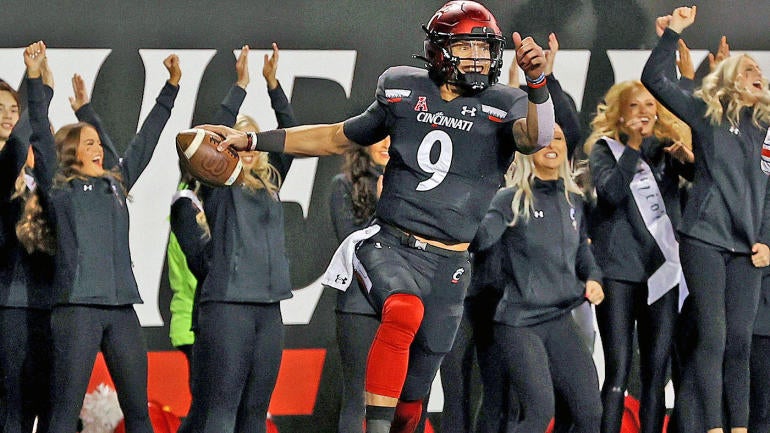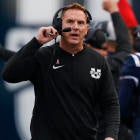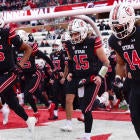
No. 4 Cincinnati is the ultimate underdog entering the College Football Playoff. Before becoming the first Group of Five team to make it to the CFP, Cincinnati had to win 22 consecutive regular-season games across two seasons, all while climbing over previous Group of Five programs -- UCF, TCU and Boise State, most notably -- that have come up just short in the quest for the ultimate opportunity.
Now that the Bearcats have been given the previously unthinkable chance, they'll face an uphill battle against the have-mores of the sport. Cincinnati ranks No. 45 in the 247Sports Composite, compared to Alabama at No. 1, Georgia at No. 3 and Michigan at No. 13. Cincinnati also has a football budget one-third the size of the rest of the field.
Don't get it twisted, though. Cincinnati isn't just happy to be here. This team is ready to compete, even with the vaunted No.1 Crimson Tide looming in the Cotton Bowl semifinal.
With obvious recruiting and resource disadvantages against three of the most historic powers in college football history, Cincinnati will need to get creative. Still, the Bearcats have a legitimate path to winning it all for the first time in program history. Here's why.
1. Aerial warfare
Georgia is the team known for defense, but Cincinnati has the best overall pass defense in the playoff. The Bearcats lead all CFP teams by allowing 168.3 yards passing per game and boast the nation's only pair of All-American cornerbacks.
Projected first-round NFL Draft pick Ahmad Gardner allowed just 17 catches all season, holding all receivers to just 117 total yards and zero touchdowns with three interceptions. His counterpart, Coby Bryant, won the Thorpe Award as the nation's best defensive back with 11 pass breakups, three interceptions and 44.3% completion percentage allowed on targets.
Alabama effectively took the SEC Championship Game to the outside as quarterback Bryce Young completed 26-of-44 passes for 421 yards and three touchdowns. Wide receivers Jameson Williams and John Metchie III combined for 281 yards and three touchdowns. Cincinnati is good enough to get stops against Alabama's passing game -- which, it should be noted, will be without Metchie -- and potentially stonewall Georgia and Michigan's pass offenses with base coverage.
2. Untapped potential
Cincinnati played conservatively down the stretch in several conference matchups, notably allowing Tulsa and Navy to cut double-digit leads into close fourth-quarter games. Instead of racking up style points, however, Bearcats coach Luke Fickell kept his eyes on the biggest stage. Now, Cincinnati enters the playoff field fully healthy -- and with cards left to play.
Defensive end Myjai Sanders (7.5 TFLs, 2.5 sacks) has rarely been unleashed on opposing defenses. Gardner has been targeted half as much as the other two corners. And after rushing nearly 300 times in his first two seasons, quarterback Desmond Ridder has been taking fewer chances with his feet over the past two. Fickell could have pushed the envelope in all of these areas, but playing things close to the vest paid off.
Cincinnati beat No. 5 Notre Dame by two scores on the road in its best game of the season. Alabama, Georgia and Michigan will be bigger tests than the Fighting Irish, but Cincinnati has plenty of wrinkles left to reveal in the playoff.
Need more college football in your life? Listen below and subscribe to the Cover 3 Podcast where we give a comprehensive breakdown of the Cotton Bowl semifinal.
3. Poised quarterback
Alabama boasts the Heisman Trophy winner in Young, but Cincinnati holds the most experienced quarterback in the playoff. Ridder has nearly as many pass attempts as the other three starters in the playoff combined -- 1,272 for Ridder vs. 1,277 for Stetson Bennett, Cade McNamara and Young -- and his development has played a massive role in the Bearcats reaching championship status.
Ridder jumped to 9.0 yards per pass attempt with 30 touchdowns to just eight interceptions as a senior in a breakout season. While his completion percentage stayed similar, Ridder jumped to a 91.5 passing grade, per PFF, including a grade of over 70 while under pressure. Perhaps most importantly, against some of the stoutest fronts in college football, Ridder is comfortable on the move with more than 2,000 yards rushing and 28 touchdowns to his name.
While Cincinnati can compete with the other three playoff teams, the Bearcats are at an obvious talented depth disadvantage. Having a senior quarterback who has seen every kind of look and turned himself into an NFL Draft pick is the secret sauce that an experienced Bearcats squad needs to reach legitimate contention.
Making a CFP case for ... No. 1 Alabama | No. 2 Michigan | No. 3 Georgia

















